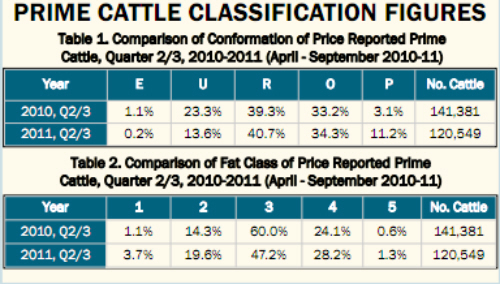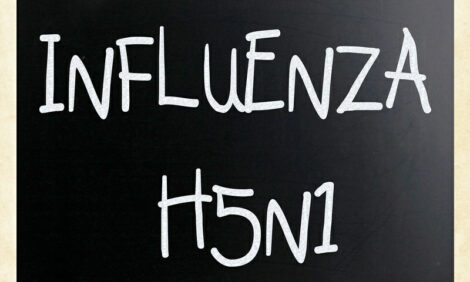



What Effect Will Eurozone Crisis Have On NI's Red Meat Industry?
With the future of the Eurozone hanging in the balance, the Northern Irish (NI) Livestock and Meat Commission discusses the future of the Northern Ireland red meat industry.Local beef quotes are currently at their highest level ever with factories quoting 326p/kg (334p/kg for in-spec) for U-3 grade heifers.
Robust demand and ongoing weaknesses in supply point to firm trading conditions for sometime to come. However, one fly in the ointment is the question mark that currently hangs over the EU economy. This week the Bulletin takes a fleeting look at what is happening in the EU economy and its potential impact on the beef trade.
Over the course of the autumn a series of political catastrophes, negative warnings and worrying statistics have shaken confidence in the Eurozone economies. Stock markets are volatile and senior political figures are using increasingly stark language to describe the situation. Politicians were hoping that economic growth would erode away the sovereign debt issues that have plagued the Mediterranean member states and with a recent EU announcement that growth has effectively stalled, it would appear that these issues are gradually reaching a climax.
As the Italian crisis has unfolded the European Commission President, Jose Manuel Barroso, was reported as saying that the collapse of the Eurozone would lead to a 1930s style depression. Christine Lagarde, the head of the International Monetary Fund says that the path to recovery is narrower now than three years ago when developed economies last sank into recession.
It would appear that Europe is teetering on the edge of an economic recession and for obvious reasons, readers of the Bulletin will be concerned about what this means for the beef industry in NI.
It is impossible to predict the future, but delving back into recent history may help to provide some idea of the path facing the industry as we look ahead. Back in 2008 the international financial crisis was characterised by a credit crunch which precipitated the global recession. Banks became nervous about lending to customers and to each other while investors hoarded money.
Confidence in the financial system hit an all time low with investors choosing to invest in commodities like gold and safe haven currencies. Unemployment soared and with brittle consumer confidence, retail expenditure came under pressure. Governments all around the world acted to address these serious economic issues with varying degrees of conviction.
To stimulate expenditure and encourage lending / borrowing the Bank of England gradually reduced interest rates back to 0.5 per cent. Governments borrowed heavily to bail out indebted banks and central banks have engaged in quantitative easing (essentially printing money) to stimulate the economy and encourage bank lending.
The American government and Federal Reserve took a similar approach. These actions appeared to have some degree of success, but the recovery now appears to have stalled in the UK and EU. Back in 2008 governments had this whole range of economic policy options at their disposal to kickstart the economy. This time around the options are more limited. Many developed western economies are now heavily indebted as a result of actions taken in 2008 and the recession which has reduced tax revenue and led to increased social welfare spending.
Concerns have now shifted to a sovereign debt crisis with rating agencies having downgraded the national debt of major economies which are having to pay heavily to finance government expenditure.
Many commercial banks are badly exposed having invested heavily in government debt in vulnerable economies like Greece and Italy. When Ms Lagarde says that the path to recovery is narrower than in 2008, she essentially is referring to the fact that many of the world’s developed economies have exhausted the policy instruments available to them to tackle recession. UK interest rates can’t go any lower. The UK government has embarked on an austerity drive and any attempt to stimulate the economy through increased government expenditure will have the impact of generating more sovereign debt. While the Bank of England’s key policy objective is keeping inflation under control, further attempts to stimulate the economy through quantitative easing will fuel inflation. Governments appear to be stuck between a rock and a hard place.
Given that there is only so much action governments can take this time around, if the EU does go into recession, there is every chance that it will be a severe one. Depending on the policy decisions taken in Brussels and elsewhere in the coming months, it could get as bad as the scenario predicted by Mr Borosso. It is not a given right now that the euro is in immediate danger; the euro does appear to be reasonably stable and euro stock markets seem resilient. Assuming, that we are not staring down the throat of some economic Armageddon and that the euro limps on through, it is worth considering the potential impact of recession generally on the EU red meat trade.
Given the UK’s close trading relationship with the EU and the government austerity measures that have impacted growth in 2010, the UK is also at risk of entering recession. If that does happen, there is likely to be some impact on demand. Consumer confidence and demand is usually one of the first casualties of recession.
During the first dip in 2008 consumers generally shifted away from beef and lamb to cheaper proteins such as chicken and pork. They also traded down to cheaper beef cuts such as mince and stewing and away from roasting joints etc.

In many respects beef demand has recovered since then and the scope for pork and chicken to undermine beef demand has been removed somewhat given the increased feed costs which has a greater than proportionate impact on intensively produced proteins. However, any further weakening in consumer confidence and real incomes would be expected to put pressure on beef and lamb demand. Foodservice is also likely to be hit by a return to recession.
Of course, the NI industry does not just deal with GB markets, and EU sales represent a growing proportion of their business. In the last three years, exports to the EU from the seven major slaughter houses in NI have increased by 137 per cent. This diversification is commendable and valuable, but the ease of trading with EU customers could be negatively impacted by a deep European recession and a weaker euro.
With the Eurozone in crisis, it is possible that sterling could become regarded as a safe-haven currency and there will be concerns about the potential for sterling to appreciate against the euro leaving our beef and lamb exports to the EU less competitive. Such developments would also have a serious impact on the live trade. Stronger sterling would encourage the northbound trade in calves, store and finished cattle out of the south, while the southbound lamb trade would be impacted. A strong currency is not typically favourable for local producers given the potential impact on the live trade and red meat export opportunities.
However, the likelihood of a sharp decline in the value of the euro against sterling must be questioned. While the markets are obviously nervous about the future of the euro, sterling has sofar not received much of a boost in its relative value. The Eurozone has been lurching from one crisis to another for the last couple of years, but none of these developments have caused the euro decline back to 2007 levels when it was worth 66 pence.
Various analysts have forecasted that sterling would appreciate against the euro in recent years, only for these predictions not to materialise. It remains to be seen what happens with exchange rates, but while the euro is at risk, it is not a given that the Euro will decline sharply against the pound in the coming months.
The impact of deep recession on policy also should be considered. In mid- 2012, EU and Mercosur (South American) officials are expected to exchange offers in a bi-lateral free trade deal. Exporters of industrial goods from the EU are keen to win access to the lucrative Mercosur market. The South Americans are obviously very keen to gain more favourable access to the EU agriculture market. Decisions must also be made on the implementation of CAP reform and the CAP budget itself. These decisions may be made in the context of recession which could influence EU policy makers.
Clearly, there is not much to be positive about when discussing the impact of a potential global economic upheaval with its epicentre at your backdoor. However, there are some reasons for red meat producers to remain positive. Consumers did not abandon beef altogether during the last recession and that will not happen this time around either. Demand, particularly for higher end product may be impacted, but it should be remembered that supply as well as demand determines price. If we are once again on the verge of a serious recession, it is somewhat fortunate that beef supplies over the coming year are predicted to be tight. Forecasts of a two per cent decline in beef production across the EU in 2012 provide reassurance. Production right across the British Isles is expected to be lower next year. Even with the prospects of weaker demand, these supply factors could help to underpin prices during recession.
One of the reasons for the strong beef market in the last year has been robust demand from developing economies in Asia, South America and in the Middle East / North Africa. Very recently the US has posted more positive growth figures. Even if demand does soften in Europe, strong demand conditions elsewhere could help to ensure that the trade remains firm. However, this will depend on how trading conditions in the rest of the world develop in 2012, which may in turn depend to a certain extent on how the problems in Europe unfold.
While producers are concerned about a potential agreement with the South American Mercosur countries, pressure on the euro compared to the currencies of strong developing economies like Brazil, could mean that the threat of lowly priced imported beef will be offset by exchange rates. Recession also puts downward pressure on commodity prices such as cereals and oil and this may also have the impact of helping to reduce producers’ input costs.
Despite all of the negative press, it is important to remember that we are not currently in recession either in the UK or in the EU. Next year is another matter however and while it does seem clear that the ongoing economic recovery has stalled, it is very difficult to predict how this continuing economic crisis will unfold. Depending on how serious the situation in the Eurozone is allowed to become, the impact could widen out and impact the rest of the world. NI producers will be hopeful that the worst doesn’t happen in the Eurozone and that tight supplies continue to contribute to strong trading conditions regardless of any potential contraction on the demand side.


